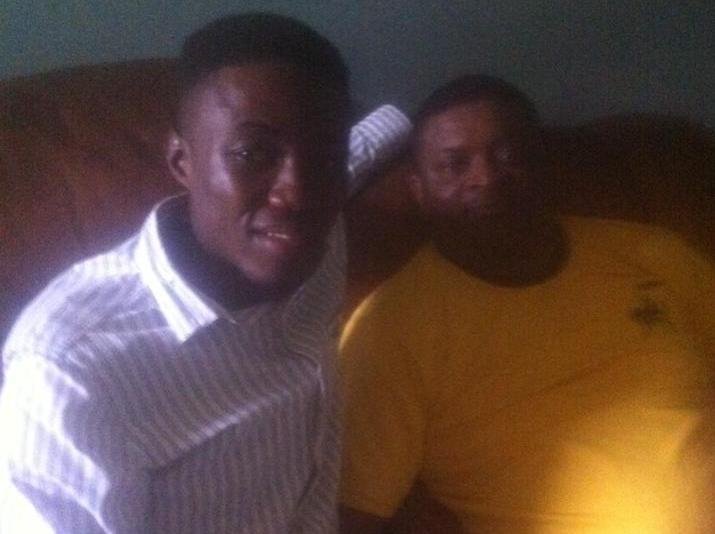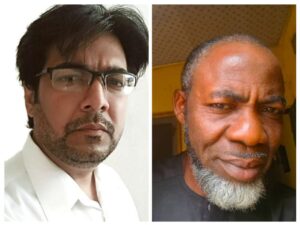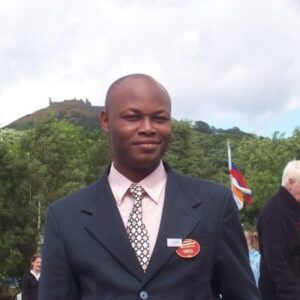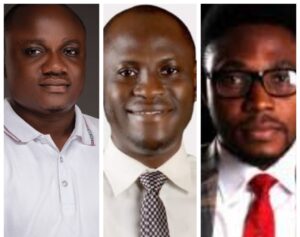Correspondent of Media Career, Raphael Adenaike recalls his last interview with Mohammed Fawehimi, lawyer and first son of the legal luminary Chief Gani Fawhinmi, who recently died in Lagos.
“There is no country I haven’t been to for treatment – England, Germany, Israel, name it,” Mohammed Fawehinmi had told me off-the-record about his health condition.
Fawehinmi had invited me to his GRA, Lagos home in June 2017 for an exclusive interview. At the time, I was the politics page Editor of the defunct Greennews.ng, my first journalism employer. On that page, there were, I presume, four categories – politics updates, interviews, parliament, and grassroots which all required constant up-to-date reports.
Aside from political figures, I had a long list of prominent lawyers – Femi Falana (SAN), Barrister Monday Ubani, Mohammed Fawehinmi, Fred Agbaje (of blessed memory), to mention but a few. I always contacted them for elaborate interviews, and perhaps when I needed a legal perspective on certain national issues.
It wasn’t easy chasing them for interviews. I always exhausted every means of access – text messages, electronic mails, phone calls, office visitation, events.
I would phone, they wouldn’t respond. If I’m lucky to have, perhaps, Falana answer my phone call, he could say his week was occupied and wouldn’t be available for any interview session. On sensing his lack of interest, I would rush to say, “can I quickly ask a few questions now. I will round-off in less than 5 minutes.” After consenting, then, I began to record our conversation using my mobile phone.
Among all these lawyers, Fawehinmi, was always available to speak, anytime, any day, and on any national issue.
Our last moment together was in June 2017, when he invited me to his GRA, Lagos home.
“I’m at the gate, sir.”
“Okay. Someone is coming to pick you,” Fawehinmi responded.
As the gate creaked open, I was ushered into the compound by a young dark-skinned boy, who introduced himself as Kayode. He was of average height. He is either a domestic staff or a relative of the family, I thought.
He accompanied me into the building. I sat on a brown three-seater sofa in Fawehinmi’s living room, waiting to receive him while Kayode went inside one of the rooms to fetch him.
As he was being wheeled out from his, I presume, bedroom, I stood in reverence.
“Ba wo ni. (How is it?),” he asked looking at me eyeball-to-eyeball.
“Mo wa sir. (I’m fine sir)”
“Hope it wasn’t hard locating my house,” he asked.
“No sir. I’m familiar with the GRA,” I responded.
Kayode managed to move him from the wheelchair to the couch. I offered to assist him, but the legal luminary told me not worry. “He knows how he does his thing,” said Fawehinmi referring to Kayode.
We both sat side-by-side on the three-seater sofa.
Before I went into the business of the day, I asked him how he had been coping with his health combined with work.
“It has been God,” he said, “I still feel a lot of pains. But I regularly observe my medications. Sometimes, I use sleeping pills just so I wouldn’t disturb the people around me when the pain starts.
“I’m even considering herbal concoctions. But we cannot get authentic ones in this Lagos.”
He added that “there is no country I haven’t been to for treatment – England, Germany, Israel, name it.”
What I can authoritatively say, is that he was always in pain from the period of the accident till my last encounter with him. Maybe his pains subsided after 2017, I wouldn’t know.
He asked me for a favour.
“I will even like you to help get a young lady who can help me with the computer to type and print documents,” he said while attempting to demonstrate with his injured hand.
“Okay, no problem sir,” I responded.
We spoke further, off-the-record, on other issues. He told me something, which, if revealed here, I will only be guilty of betraying his memory.
On record, here was the interview I had with him. Bukola Saraki, a formal Senate president had just been discharged and acquitted at the Code of Conduct Tribunal (CCT) over alleged false asset declaration. I had him air his view on the controversial case.
He believed it was a “political arrangement”. Fawehinmi said if he was the prosecuting counsel, the former Kwara State governor would have been sentenced to jail.
On a lighter note, I asked him to comment on the performance of the present Muhammadu Buhari-led administration. His remark was average, perhaps because there were not many crises in the country at the time compared to what we have now.
But he loved Buhari as an individual. He described him as a “fantastic man”. He had told me that he owed his life to the president.
Buhari as the country’s military head of state between 1980 and 1985, had dealt with the Maitatsine sect in the 80s. Similar to activities of the Boko Haram sect, the Maitatsine group launched attacks on schools, religious centres, government establishments in the northern part of the country.
Like Abubakar Shekau of the Boko Haram sect, the leader of the Maitatsine group was Muhammed Marwa, a controversial Islamic preacher with lots of followers.
“The Maitatsine sect just like this Boko Haram came to our school. He (Buhari) had information that they were ravaging schools. So, he sent soldiers and they came to the periphery and sent in mobile policemen. They were able to catch some of them while trying to escape,” Fawehinmi had said.
“He saved my life when I was in the Federal Government College, Sokoto. He saved my younger brother’s life when he was in the Federal Government College, Maiduguri. So, I owe him a lot”.
One of the things I have learnt as a journalist is that many of the public figures we report about have personal human-interest stories they may not be willing to share with the public. We only have a glimpse, perhaps more, when we move closer to them.
Mohammed Fawehinmi’s kind was rare. As an activist, his voice was loud on issues of corruption, oppression, human rights violation, et al. Like father, like son. The only major difference, I believe, was that one was limited in the capacity as a result of an accident that confined him to the wheelchair, while the other could navigate his way anywhere, anytime with his ‘footwagen’.
The kinds of lawyers who dominate the legal sector today are ones I like to describe as ‘jeun jeun’, those driven, not by passion but money.
Respect to Fawehinmi.
May his soul find eternal rest.
And may the Lord give the deceased family fortitude to bear the loss.






